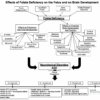Fragile X Syndrome Genetic Test | FMR1 Test
$399.00
CPT – #81243
FRAGILE X SYNDROME GENETIC TEST (LABCORP)
FMR1 CGG Repeat Analysis with Optional Home Phlebotomy
Fragile X Syndrome is one of the most common inherited causes of developmental delay, learning differences, and autism-related traits. This diagnostic test analyzes the FMR1 gene to determine whether your child or family member carries a full mutation, premutation, or intermediate repeat range. Testing provides a clear genetic explanation when symptoms include speech delay, sensory challenges, anxiety, or behavioral differences.
This is the exact test used by developmental pediatricians, neurologists, and genetic specialists — now available directly through Second Opinion Physician with a LabCorp requisition and optional home specimen collection.
What This Test Detects
This LabCorp assay (Test #481701) measures:
-
Number of CGG repeats in the FMR1 gene
-
Classification into full mutation, premutation, intermediate, or normal ranges
-
Reflex methylation testing when indicated (LabCorp protocol)
This genetic test identifies whether the FMR1 gene is functioning normally or showing an expansion that affects brain development and protein production.
Who Should Consider Fragile X Testing?
Families often pursue this test when a child presents with:
-
Developmental or speech delay
-
Autism diagnosis or autism-like traits
-
Social anxiety or extreme shyness
-
Hyperactivity, impulsivity, or attention difficulties
-
Sensory sensitivities
-
Learning challenges of unclear cause
Adults may benefit from testing if they have:
-
Tremor, balance issues, or neuropathy later in life (possible FXTAS)
-
Fertility issues or early menopause (possible FXPOI)
-
A family history of Fragile X Syndrome or premutations
-
Interest in carrier screening before pregnancy
Why Test for Fragile X Syndrome?
A confirmed Fragile X diagnosis helps families:
-
Understand the underlying cause of developmental or behavioral challenges
-
Identify risks to other family members
-
Plan early intervention and support strategies
-
Access informed genetic counseling
-
Distinguish Fragile X–related traits from other conditions
For many parents, the clarity of a definitive genetic answer brings relief and direction.
What’s Included With This Test
When you order the Fragile X Syndrome test through SOP, you receive:
-
A test requisition -Test #481701
-
Instructions for specimen collection
-
Full laboratory report
-
Optional Consultation with detailed assessment, including summary of questionnaire/history, next step recommendations and follow up testing.
How the Process Works
1. Order the test
You will receive a test requisition form by email.
2. Choose your blood draw location or contact local mobile phlebotomist
3. LabCorp processes the FMR1 test
Your sample is analyzed via molecular genetics laboratory.
4. Receive results and interpretation
Results classify the CGG repeat count and indicate whether the mutation is normal, intermediate, premutation, or full mutation.
Test Details
-
Specimen: Whole blood (EDTA tube)
-
Turnaround Time: Typically 1–3 weeks
Is This Test Enough on Its Own?
Yes. Fragile X testing is a stand-alone genetic test intended specifically to determine the FMR1 mutation range. It does not assess behavior, nutrient status, copper, methylation, or environmental factors.
However, many families choose to explore additional non-genetic evaluations after receiving Fragile X results — especially if symptoms appear more intense than expected or if multiple siblings show behavioral or developmental concerns.
Additional Evaluations Available (Optional)
(These tests are not part of Fragile X testing but may help build a broader picture.)
-
Methylation & Biotype Panel for nutrient-related factors
-
Copper–zinc balance, histamine levels, and oxidative stress markers
-
Functional assessments to understand non-genetic contributors to mood, attention, or sensory sensitivity
These are not substitutes for Fragile X testing but may be helpful for families seeking a deeper, more personalized assessment.
A Clear, Compassionate First Step
Fragile X Syndrome testing provides clarity, direction, and an essential foundation for supporting your child’s development. With flexible draw options and thorough result interpretation, Second Opinion Physician and Dr David Epstein, D.O., makes this process simple, accessible, and guided by clinical expertise.


